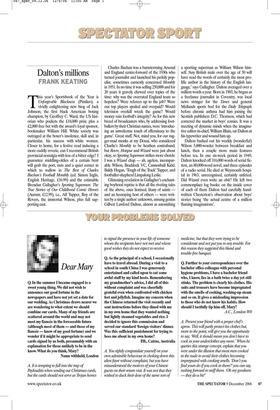Dalton’s millions
FRANK KEATING
This year’s Sportsbook of the Year is Unforgivable Blackness (Pimlico), a vividly enlightening new biog of Jack Johnson, the first black American boxing champion, by Geoffrey C. Ward, the US historian who pockets the £18,000 prize plus a £2,000 free bet with the award’s loyal sponsor, bookmaker William Hill. White society was outraged at the boxer’s insolence, skill and, in particular, his success with white women. Closer to home, for a festive read inducing a more cuddly reverie, can I recommend British provincial nostalgia with less of a bitter edge? I guarantee middling-oldies of a certain bent will grab the port, nuts and a quiet corner in which to wallow in The Best of Charles Buchan’s Football Monthly (ed. Simon Inglis, English Heritage, £16.99) and the estimable Brendan Gallagher’s Sporting Supermen: The True Stories of Our Childhood Comic Heroes (Aurum, £12.99), i.e., Alf Tupper, Roy of the Rovers, the immortal Wilson, plus full supporting cast. Charles Buchan was a barnstorming Arsenal and England centre-forward of the 1930s who turned journalist and launched his perkily populist, sometimes earnestly concerned Monthly in 1951. In no time it was selling 250,000 and for 20 years it gravely chewed over topics of the time: why was the overrated England team so hopeless? Were referees up to the job? Were our top players spoiled and overpaid? Would television overkill wreck the game? Would money ruin football’s integrity? As for this new breed of broadcasters who, by addressing footballers by their Christian names, were ‘introducing an unwelcome touch of effeminacy to the game’. Great stuff. Not, mind you, for our rugger-mad monks at my Douai, who considered Charlie’s Monthly to be heathen contraband; but Rover, Hotspur and Wizard were just about okay, so Sporting Supermen strikes more chords: I was a Wizard chap — ah, ageless, incomparable Wilson, Braddock VC, Cannonball Kidd, Baldy Hogan, ‘Tough of the Track’ Tupper, and footballer-shepherd Limpalong Leslie.
Glistening revelation in Gallagher’s enchanting boyhood reprise is that all the riveting tales of the above, once lionised, litany of saints and an hooraying host of others — were written by a single author: unknown, unsung genius Gilbert Lawford Dalton, almost as astonishing a sporting superman as William Wilson himself. ‘Any British male over the age of 50 will have read the words of certainly the most prolific author in the history of the English language,’ says Gallagher. Dalton averaged over a million words a year. Born in 1903, he began as a freelance journalist in Coventry, was local news stringer for the Times and general Midlands sports bod for the Daily Telegraph before chronic asthma had him joining the Scottish publishers D.C. Thomson, which had cornered the market in boys’ comics. It was a meeting of dynamic minds when the imaginative editor-in-chief, William Blain, sat Dalton at his typewriter and wound him up.
Dalton bashed out his weekly (wonderful) Wilson 5,000-worder between breakfast and lunch, then a couple more main features before tea. In one six-week period in 1949, Dalton knocked off 316,000 words of serial fiction, an 80,000-word novel, and three episodes of a radio serial. He died at Weymouth hospital in 1963, unrecognised, certainly unfeted. Did Wizard even write an obit? He left two commonplace log books: on the inside cover of each of them Dalton had carefully handwritten Chesterton’s observation about boys’ stories being ‘the actual centre of a million flaming imaginations’.


























































































 Previous page
Previous page